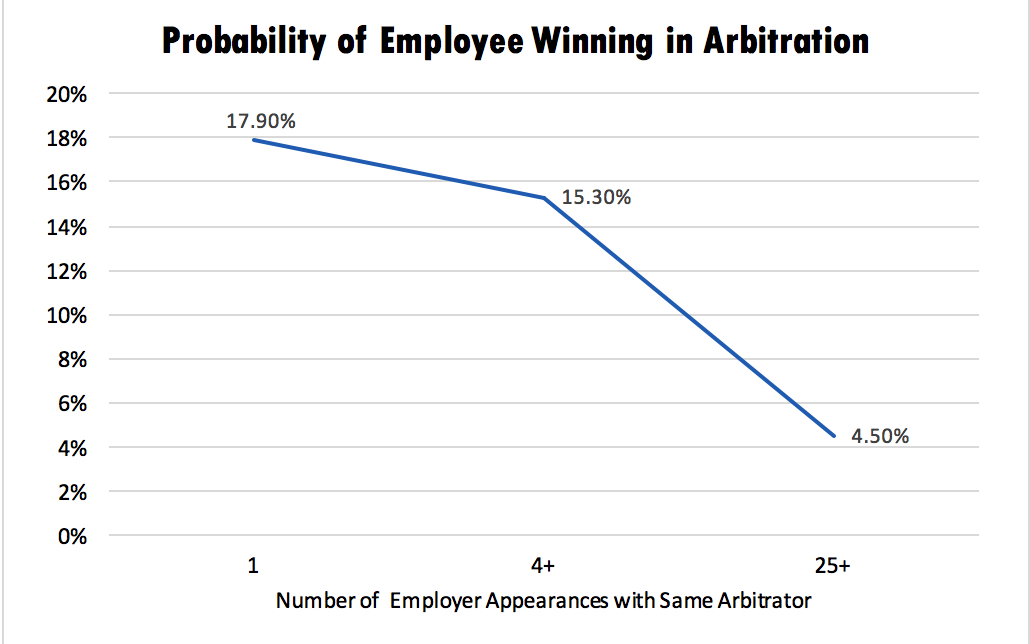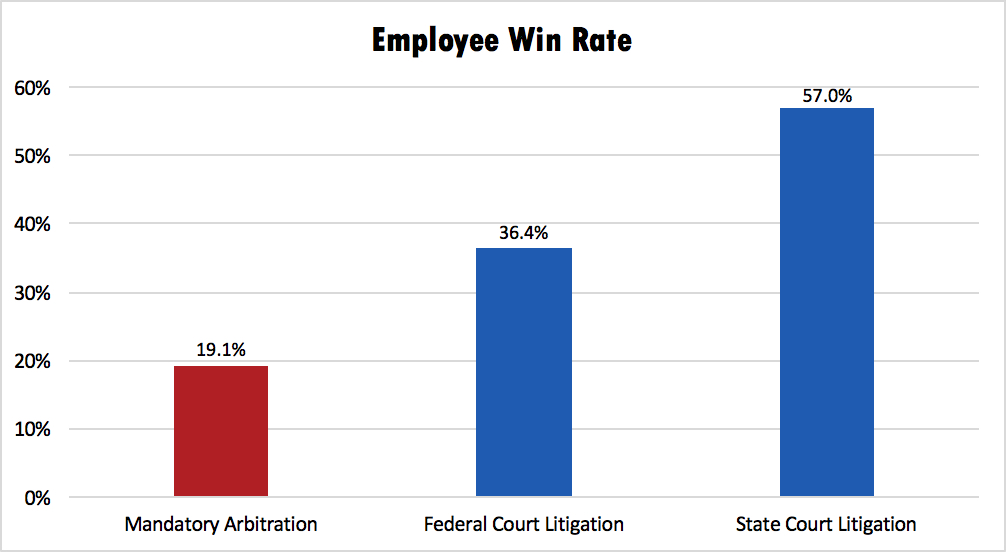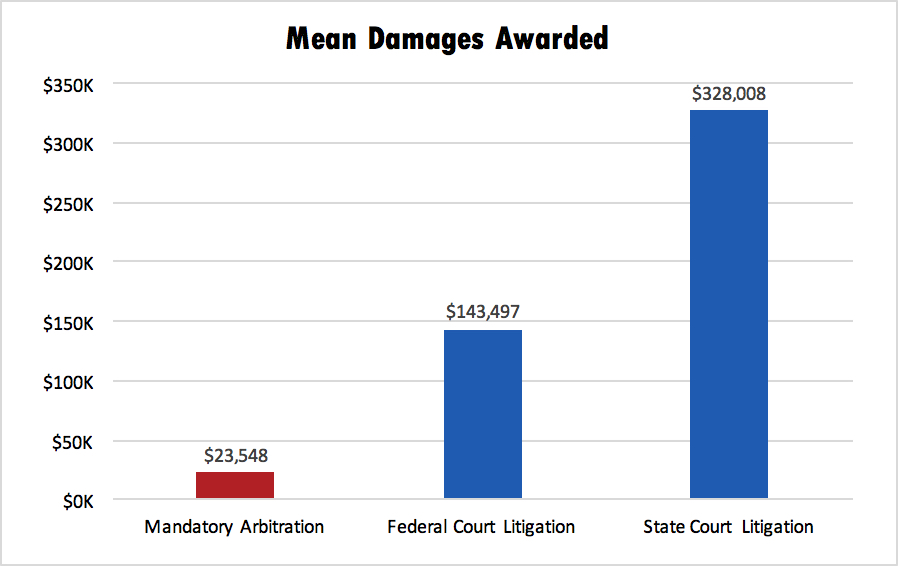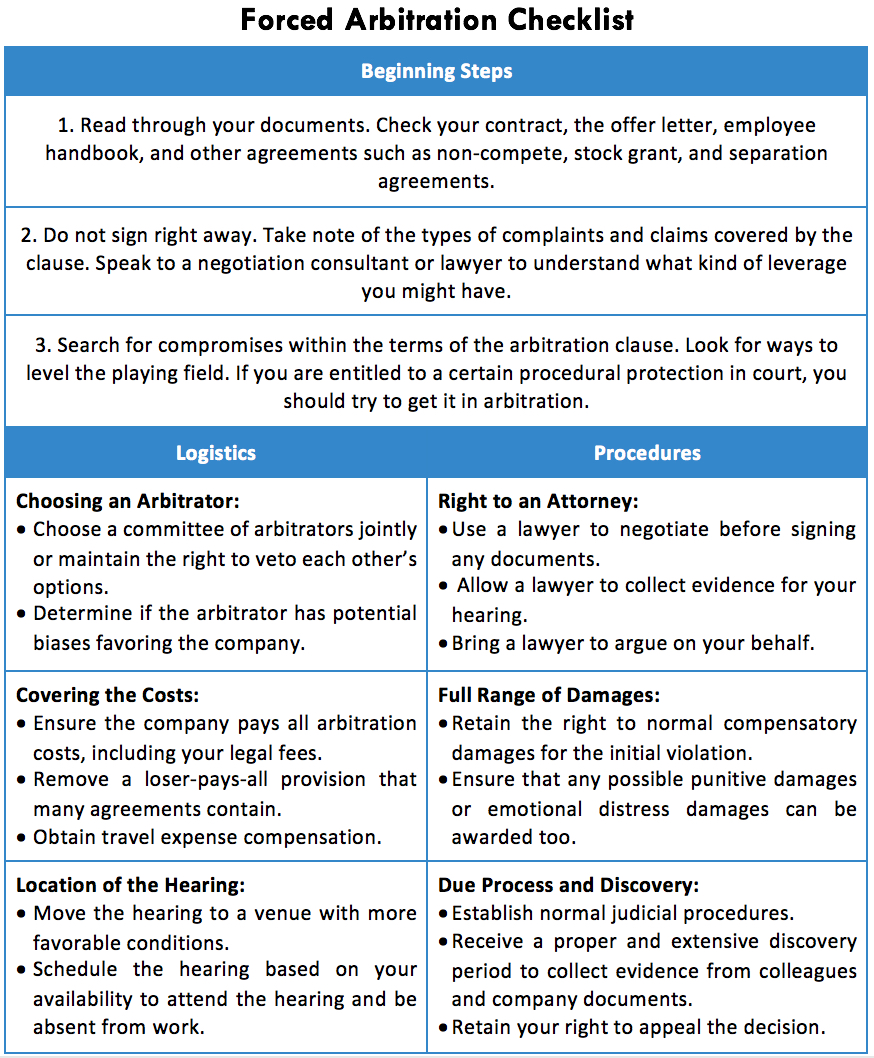Beware of the Fine Print – Forced Arbitration Clauses in Employment Contracts

If you watch Netflix, shop on Amazon, have certain credit cards, or use a major cell phone service provider, most likely you have already agreed to contractual terms that are snuck into endless pages of consumer agreements as “terms of service.” One important clause often overlooked in these consumer agreements also frequently appears in your employment agreements and can impact your rights with your employer – especially if there is ever a dispute. Lurking in various agreements are forced arbitration clauses.
A forced or mandatory arbitration clause can prevent you from bringing a lawsuit against your employer in a court of law or from having a jury trial. Instead, the clause subjects your claim to an arbitration process that favors your employer and the company. When starting your next job, avoid being forced into signing binding arbitration clauses to the extent possible.
This article will help you better understand the forced arbitration clauses that could be hiding in your next employment contract, and how to handle them.
Understanding Forced Arbitration & Why It Benefits Your Employer
Arbitration serves as an alternative dispute resolution mechanism. Removed from the court system, the process involves a private citizen serving as an arbitrator who decides the outcome of the dispute. Often these arbitrators are retired judges or lawyers. Typically, each side presents evidence supporting its arguments. The arbitrator makes a binding decision that may not be publicized, often must remain confidential, and may be final (i.e., you cannot appeal the decision).
Why do companies like these clauses? They lower your chances for success, demand your silence, and stay beyond the eyes and ears of the public court process.
The case of Gretchen Carlson, formerly of Fox News, who recently settled a sexual harassment case for a reported $20 million, exhibits some of the problems with forced arbitration. A forced arbitration clause prohibited her from suing Fox directly in court for sexual harassment. Additionally, Carlson is bound to confidentiality. She cannot discuss any facts involving her claim without possibly losing her settlement money.
Forced arbitration clauses restrain employees in ways that directly protect the company’s interests – often at the expense of the best interest of the employee.
1. Lower Success Rates for Employees
Forced arbitration comes with many downsides for employees. In some arbitration cases, standard rights to due process – guaranteed by the courts to promote fairness under the law – may not be granted. You may even have shorter statutes of limitations, altered burdens of proof, and different evidentiary discovery rules. Not only do you waive your right to a jury trial with mandatory arbitration, but you may also forgo your ability to appeal the arbitrator’s decision by signing away certain rights.
Your employer designs the process in its favor. Often, your employer retains the right to choose the arbitrator. Your employer’s choice may have ties to the company or industry, and thus be more sympathetic to it. The data support the negative impact on employees when the arbitrator is “cozy” with the employer or industry. According to a 2015 report by the Economic Policy Institute (EPI), the employee’s chances of winning drops significantly as the number of employer appearances in front of the same arbitrator increases.

Source: Economic Policy Institute (2015)
The EPI study also points out that the win rate for employees in arbitration against their company is significantly lower than the win rate in federal and state courts.

Source: Economic Policy Institute (2015)
2. Smaller Damages Awarded
When employees win a dispute against their employer, the damages awarded by the arbitrator are lower than those awarded in litigation on average. Not all cases end with significant pay days like Gretchen Carlson’s. On the contrary, they can be unsuccessful, career limiting, and costly.
In mandatory arbitration, the employee payout is on average 16% of the damages awarded in federal court. When compared to state court results, employees are awarded just 7% of what the court would grant on average. With lower potential damages awarded, you stand to lose even before your hearing. When considering securing quality legal representation, this could cause issues – either your lawyer will make less, given your probability of success and potential payout, and thus may not want to take on your case on a contingency-fee basis, or hiring a lawyer billing by the hour will not be cost effective for you.
The chart below shows the significant difference in mean damages paid out in mandatory arbitration cases compared to federal and state court litigation cases. This includes the cases that employees lose (i.e., receive nothing in damages).

Source: Economic Policy Institute (2015)
3. A Money Saving Measure?
The cost cutting rationale behind arbitration can be misleading. While litigation can be burdensome and inefficient, arbitration may impose more costs on you than the court system. Lawyer fees from arbitration can be comparable, but your overall financial obligation can balloon if you lose.
Your employment agreement could include a stipulation requiring the arbitration loser to cover all of the costs associated with the dispute resolution process. Not only is your success rate lower with arbitration, but you may also be stuck with your bill and your employer’s fees in reaching your losing outcome.
The location of the arbitration hearing can also raise the final cost. Your contract may give the company the exclusive right to choose the venue for the arbitration hearing. If so, this could impose travel costs, require days away from a new job, and may subject you to procedural guidelines or venues that favor your employer.
In a class action lawsuit, a lawyer or group of lawyers may be more willing to take on the case on a contingency-fee basis instead of requiring an hourly billing rate. If the company has a pattern of wronging employees, being part of a class action could reduce or eliminate your legal costs. Many arbitration clauses, however, restrict this option too.
Where Are They? Identifying Arbitration Clauses in Your Employment Contracts
Forced arbitration clauses can be found in employment contracts, non-compete documents, separation agreements, and stock grant agreements. Read all the documents that you may have received from human resources, or are associated with your salary and bonuses. You should even check your employee handbook.
When reading through what could be a copious amount of documents, look for language concerning:
- Binding or mandatory arbitration.
- Arbitration processes in general.
- Jurisdiction, venue, and governing law provisions.
- Language on financial obligations through any dispute processes.
These clauses may also include language that explains the scope of laws and types of complaints they cover. Pay attention to this language too. It will determine what kinds of lawsuits you can file that might be eligible for a jury trial. Remember you should not stop reading if you find the language in one document. These clauses can be in multiple documents, and the terms may not be identical in each document.
So What Can You Do?
After identifying a forced arbitration clause, you need to decide whether you will sign the agreement or not. Weigh the consequences of not signing given your specific professional, personal, and financial circumstances. Decide whether you are willing to walk away from the job opportunity if the company will not compromise. Also, consider the amount of leverage you have with your employer.
If you decide that you must sign some kind of arbitration agreement, then committing to these terms may not be your only option. You should always try to negotiate out of these clauses. This should be your next step.
Aim to fully remove arbitration clauses from the contract. If this is not a realistic option, however, then try to regain some rights by targeting the following provisions as you bargain with your employer:
1. Choosing the Arbitrator
Both you and your employer should have equal input when choosing an arbitrator. Incorporate the ability for each side to veto at least one of each other’s choices to ensure that no industry-friendly arbitrator can be chosen without objection. This may require you to ask the company to disclose any ties with the arbitrator. You need to discover if your employer’s desired arbitrator has any potential biases.
Another option is to have three arbitrators – one chosen by you, one by your employer, and one that is jointly selected (i.e., a neutral arbitrator). When a committee must decide the case, a biased arbitrator cannot unilaterally dismiss it.
2. Costs, Location, and Timing of Arbitration
Ask that your employer covers the full cost of the arbitration process, no matter who is the ultimate winner. This is more equitable since the arbitration process is a protective measure disproportionately benefiting your employer. If you concede on venue and need to travel to any hearings, request that the company cover your travel expenses. Aim to set the timing around your schedule.
3. Procedural Rights
Your potential arbitration hearing should have procedures close to matching those you would have in court. This means ensuring you are entitled to legal representation and all other due process rights throughout the arbitration process, including the right to appeal. Additionally, you should pursue a more extensive evidentiary discovery process that can help to bolster your case. Also, include the right to pursue a full range of damages – punitive and emotional distress damages in addition to normal compensatory damages. This can maximize your payout.
Summary Checklist
Consult the following checklist for a summary of the steps you should take when evaluating a new job offer. Bargain for the opportunity to receive some of the aforementioned provisions in your employment agreement.

Source: NOLO (2017)
Remember that while you can try to get the protections listed above when negotiating forced arbitration clauses with your employer, this is only a wish list of provisions that will better your chances of success. With less leverage, you may not be able to procure every desired change to your agreement, and may have to sacrifice some of them to focus more effort on the provisions that matter the most to you.
Final Thoughts
When negotiating forced arbitration terms in your employment agreement, you are preparing for a worst-case scenario. There is power in fully knowing what is written in your contracts. Do not forfeit your rights, and head into employment contract negotiations with the goal of protecting yourself should disputes arise. Even in cases where you agree to mandatory arbitration that excludes most claims from the court system, you can still petition the appropriate government agency to file a lawsuit in a jury trial on your behalf, like the Equal Employment Opportunity Commission (EEOC) for discrimination claims.
This article has shown there are ways to make the terms surrounding mandatory arbitration fairer. The Azara Group can provide you with the tools and negotiating skills to not only identify unfavorable contractual terms and bring your employer to the bargaining table, but to actually win back forfeited rights as a result.
We help our clients negotiate better employment agreements. We help employees and senior executives expand their leverage to get more money on the table and favorable contracts for employees. It does not just boil down to compensation, but rather whether the whole deal is the right one for you. We are here to guide you through the negotiation process.
The Azara Group (TAG) is a consulting firm that promotes the development of leaders in an increasingly competitive and diverse marketplace – providing strategy consulting services and leadership training services to advance professional and life success. TAG leverages expertise in career strategy, diversity, negotiation skills, and business acumen to provide strategic advice and consulting services to help people and organizations get what they want, achieve their goals, and advance their business and career objectives. TAG also helps companies better attract, retain, and promote diverse talent, and develop robust diversity platforms and strategies to create a more inclusive workplace.
The Azara Group welcomes your direct comments and feedback. We do not post comments to our site at this time, but we value hearing from our readers. We invite you to share your thoughts with us. You can contact us directly at info@theazaragroup.com.
 The Azara Group
The Azara Group